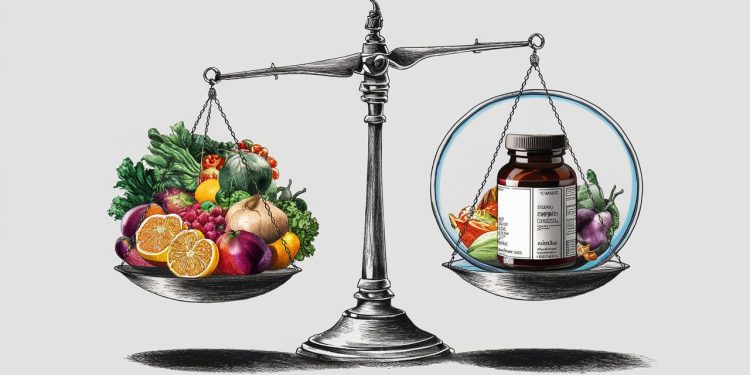When purchasing vitamins and supplements, you need to pay attention to a few key factors to not get scammed by pharmaceutical and supplement companies.
There are thousands of supplement brands out there but which company is telling the truth about their supplements anyway.
Always aim for high ingredient quality – opt for organic and non-GMO products, and avoid unnecessary additives.
Prioritize transparent labeling; you should know the quantity of each ingredient you’re receiving.
Consider different vitamin forms and pick the one that meets your needs. Third-party testing seals, like those from NSF International or USP, are critical markers of quality.
These guidelines guarantee you’re selecting a reliable, safe supplement. Keep reading, as there’s much more to understand to be confident that you’re making the right choice.
What to Look for When Buying Vitamins & Supplements?
1. Third-party testing
When buying supplements, always look for third-party testing seals from reputable organizations like NSF International or USP, as they assure you that the product meets rigorous quality and safety standards.
These seals verify that your supplements are free of contaminants and harmful elements. They’re not just for show; they’re a sign that the product adheres to Good Manufacturing Practices. This means that the supplements contain the stated ingredients in safe, effective amounts.
So, don’t just grab the first bottle you see on the shelf. Be smart about your choices. Always opt for supplements with third-party testing seals. They provide an extra layer of assurance regarding product quality and reliability.
2. Evaluating Ingredient Quality
You’ve got to scrutinize the quality of ingredients in your supplements to make sure they’re up to par.
Look for transparency on labels; avoid ‘proprietary blends‘ that don’t clearly list what’s inside.
Check for organic and non-GMO ingredients, as these indicate quality and purity.
Beware of additives like artificial coloring and flavorings – they’re unnecessary and can dilute the product’s effectiveness. Instead, opt for natural preservatives like vitamins C and E.
Also, pay attention to allergen information. If you’re allergic to wheat, dairy, soy, or peanuts, confirm that your supplement doesn’t contain these.
A concise ingredient list is always preferred. It means you’re getting what you need without unnecessary fillers. Be smart and vigilant in your choices.
3. Labels that don’t tell you how much you’re getting
It’s crucial to understand that some supplement labels might not clearly disclose the exact quantity of each nutrient per serving.
This lack of clarity can make it challenging for you to accurately track your nutrient intake.
Without precise ingredient amounts, how can you assess if you’re meeting your recommended daily intake?
This incomplete information can lead to uncertainty about the effectiveness and safety of the supplement.
Hence, avoid being fooled by vague labels. Look for products with transparent labels that clearly state the quantity of each ingredient.
This way, you can make an informed decision about your supplement intake.
4. Vitamin Forms
While keeping an eye on the label’s transparency is important, you should also consider the various forms vitamins come in like pills, liquids, powders, and gummies.
Each form has its pros and cons.
For instance, liquids and powders often have faster absorption rates compared to pills.
Gummies, while tasty and easy to consume, might contain added sugars and artificial ingredients.
If swallowing pills isn’t your thing, consider capsules and softgels as they’re generally easier to swallow and digest.
Another option is effervescent tablets that dissolve in water before consumption, providing a potentially more bioavailable form of vitamins.
So, when buying vitamins, think about what form suits you best.
5. Free of Unnecessary Additives
When shopping for supplements, make sure to select products free of unnecessary additives like artificial colors, flavors, and sweeteners to safeguard your health. It’s not just about what’s in your supplement, but also what shouldn’t be.
Opt for supplements with minimal ingredients to reduce risks of allergic reactions or side effects.
Avoid products with fillers, preservatives, or unnecessary binders that can compromise their purity and effectiveness.
Be wary of supplements containing harmful additives like high-fructose corn syrup and hydrogenated oils.
Always look for transparent labeling. It’s your right to know exactly what you’re putting into your body.
6. Bioavailability
Another thing you need to keep in mind is how good bioavailability your supplement has.
There are new technologies such as Liposomal and Sucrosomial technology that promise to offer better absorbability.
According to FoodNurish, both these methods wrap nutrients in a way that helps your body absorb them more easily.
Imagine Sucrosomial technology as a tiny shield around minerals like magnesium, protecting it until it gets exactly where it needs to go in your body.
Similarly, Liposomal technology wraps vitamins in a protective bubble made of fats called lipids, helping them bypass digestive barriers.
While both aim to enhance how well our bodies can use the supplements we take, deciding which one is superior depends on various factors including the specific nutrient being delivered and individual health needs.
Bottom Line
In sum, purchasing vitamins and supplements isn’t as intimidating as it seems. Just remember, look for third-party testing, scrutinize ingredient quality, and avoid labels lacking dosage info.
Consider the form your vitamins come in, and steer clear of unnecessary additives. With these tips in your pocket, you’re well on your way to a more informed, health-conscious shopping experience.


 Home
Home









